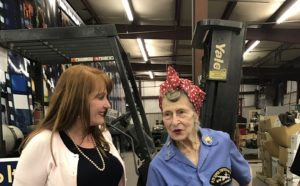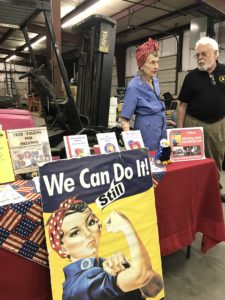Is Your Company Ready for the Next Rosie the Riveter?
 The construction industry faces a big problem when it comes to filling qualified labor shortages, but many simple solutions can add up to significant return. After participating in last month’s Power Up event, promoting construction careers to young women, Debbie Dickinson, CEO offers these ideas for employers seeking to attract a new generation of workers—whether male or female.
The construction industry faces a big problem when it comes to filling qualified labor shortages, but many simple solutions can add up to significant return. After participating in last month’s Power Up event, promoting construction careers to young women, Debbie Dickinson, CEO offers these ideas for employers seeking to attract a new generation of workers—whether male or female.
“We heard great insights from speakers Kayleen McCabe of DIY Network’s Rescue Renovations and a vivacious senior woman, who was a real-life Rosie the Riveter during World War II,” said Dickinson. In addition, Dickinson joined a panel discussion with  Fulton County College and Career Director, Lorissa Edwards, and student panelist, Breionna Glover.
Fulton County College and Career Director, Lorissa Edwards, and student panelist, Breionna Glover.
In a recent article, The Business Case for Diversity and Inclusion, author Brent Darnell says: If all industry organizations and companies would commit to some very simple initiatives, we could improve diversity and inclusion dramatically in a relatively short time.” He claims that evidence suggests the industry does not value diversity, which creates barriers for wooing outsiders to join the construction workforce.
Get involved in local workforce development groups. State and local groups can help connect employers to re-entry citizens, transitioning veterans, graduating high school students, and others looking for a new career opportunity. Often funding is available to offset costs of training programs for these individuals. Find a workforce development boards in your area at CareerOneStop, a website sponsored by the U.S. Department of Labor.
 Be an industry partner with career and technical educators. More and more school districts are getting on board with providing students with an education that makes them career ready. But that takes a commitment from business and industry to supply field trips, internships, subject matter experts, and more. Check out Construction Career Pathways Conference, Dec. 6, 2017, Nashville, Tenn.
Be an industry partner with career and technical educators. More and more school districts are getting on board with providing students with an education that makes them career ready. But that takes a commitment from business and industry to supply field trips, internships, subject matter experts, and more. Check out Construction Career Pathways Conference, Dec. 6, 2017, Nashville, Tenn.
Agree to mentor someone. Provide role models. As Brent Darnell says, this means “providing meaningful training for the white guys.” An article published by Chief Learning Officer provides suggestions for how male mentors can develop women at work. The principles apply to reaching minorities or other under-represented demographics in the workforce.
Create training opportunities or make training accessible. This might be as simple as funding transportation for students from school to your business or job site for hands-on instruction. Or lobby your state to recognize October as Careers in Construction month, then host an open house. NCCER can provide free sample text for writing a proclamation.
If you are genuinely interested in hearing from young people or minorities, then roll up your sleeves like Rosie and get to work making it happen in a meaningful way for your company.
